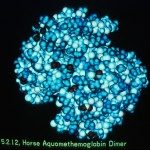Lien vers Pubmed [PMID] – 25450803
Int. J. Antimicrob. Agents 2015 Jan;45(1):19-24
Community-acquired meticillin-resistant Staphylococcus aureus (CA-MRSA) causes severe diseases through virulence factors such as staphylococcal protein A (SpA), which favours immune evasion. We have previously shown that antimicrobial peptides (AMPs) and antibiotics decrease SpA expression in CA-MRSA strains. Here we examined the effects of antibiotics and AMPs, alone and in combination, on SpA expression in various CA-MRSA strains. Six S. aureus isolates corresponding to the major worldwide CA-MRSA clones (ST8-USA300, ST80 and ST30) were selected. Strains were cultured to exponential growth phase and were subsequently incubated with antibiotics (tigecycline, linezolid, clindamycin and vancomycin) at 0.25× MIC or with AMPs [human neutrophil peptide (HNP)-1-3] at the LD50, alone and in combination. After 6h, cultures were assessed for spa mRNA by RT-PCR, whilst SpA protein was measured by specific ELISA after 18h. When used alone, antibiotics (clindamycin, linezolid and tigecycline) or HNPs significantly reduced both SpA production and mRNA levels in ST30 and ST80 strains. When used in combination, HNPs and clindamycin, linezolid or tigecycline synergistically reduced SpA production (6-100-fold) and spa mRNA levels (4-20-fold) in ST80 and ST30 strains. In contrast, for USA300 strains, among all antibiotics, clindamycin alone reduced SpA production (3.5-fold), whereas with combined treatments including HNPs, only a slight reduction in SpA production (1.7-2.2-fold) was observed. In conclusion, antibiotics and AMPs do not modulate SpA expression in USA300, unlike in other CA-MRSA clones. This observation suggests that the virulence and successful spread of USA300 strains is associated with a specific regulatory network.

